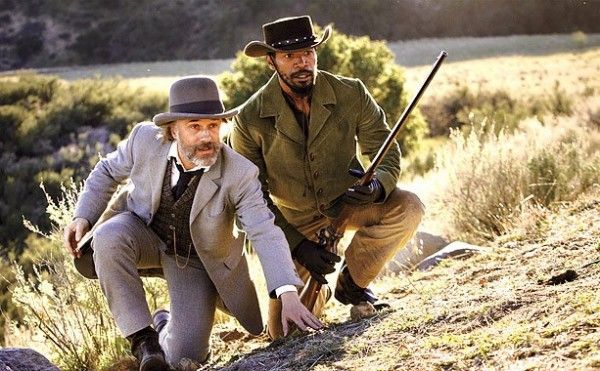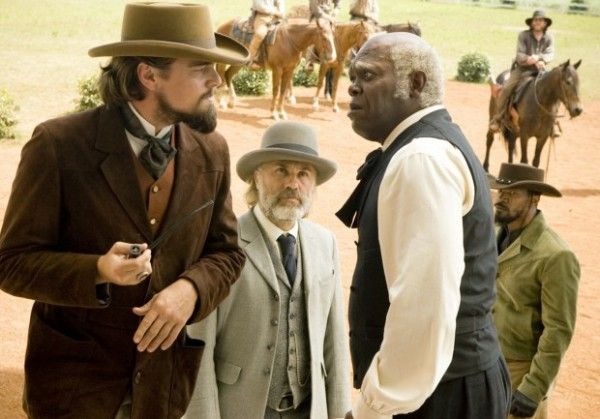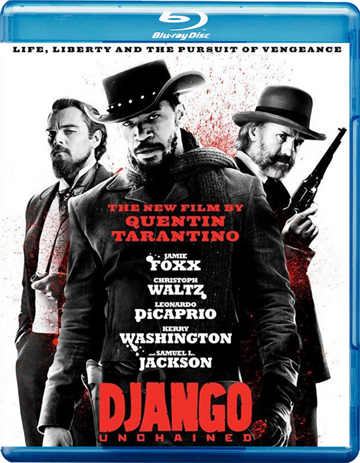When does self-indulgence trump talent? Plenty of directors have tested that boundary to their detriment: witness the litter of auteurial “visions” that almost destroyed the studio system in the late 1970s. Quentin Tarantino hasn’t gotten there yet. His voice shines too bright and his visions are too singular to let their increasing flabbiness bother us. But while his epic Django Unchained remains a terrific entry in his canon, one wonders how much farther it would have gone if the director could just get out of his own way. Hit the jump for my full review of Django Unchained on Blu-ray.
The problems with Django don’t stand a chance against its positive qualities, as Tarantino takes us through another grindhouse-infused revisionist historical bloodbath. He redefines the escaped slave narrative as a high-flown revenge saga, doing for blacks in antebellum America what Inglourious Basterds did for European Jews. At its heart sits Django (Jamie Foxx), a rebellious slave liberated by wily bounty hunter Dr. King Schultz (Christoph Waltz) as part of an elaborate scheme to collect the reward on some bad men. In exchange for Django’s help Schultz will aid him in rescuing his wife (Kerry Washington) from sadistic plantation owner Calvin Candie (Leonardo DiCaprio).
For oh, we’ll say 70 percent of its running time, it makes good on the promise of Tarantino’s one-of-a-kind mayhem. He gleefully riffs on the gratuitous emotions of revenge fantasies, sprinkling in bits of exaggerated history and plenty of self-referential smirks to keep it spicy. The film’s best moments brim with his passion of cinema, accompanied by a few twinkly eyed reminders to have a little fun. (My favorite gag involves DiCaprio’s drink, which easily matches Waltz’s ridiculous Meerschaum pipe in Basterds.) The dialogue sparkles, as always, and the game cast (which also includes Samuel L. Jackson and Don Johnson, among others) benefits from their director’s obvious affection for their craft.
It’s all the more surprising considering the delicate nature of the material, with its meditations on race, justice and our nation’s less-than-spotless history of both. One shudders to think of another white director taking this on, or indeed of doing so with Tarantino’s over-the-top absurdity. As always, the humor goes hand-in-hand with shocking brutality, along with the kind of language that got Michael Richards in big trouble. If anyone else had attempted it, he’d be pilloried faster than you can say “Spike Lee press conference.” But somehow, the man pulls it off… and in grand style to boot.
So what’s the problem then? For starters, this dog sports some. Tarantino’s willingness to flesh his concepts out to the fullest means that we spend a lot of time spinning our wheels. It’s not unpleasant considering the company, but eventually you start wishing he’d just get on with it. The last forty minutes in particular, grinds on like a root canal: full of false climaxes, awkward plot turns and an unusually embarrassing acting cameo from Tarantino himself. A little more discipline in the editing room might have cured such issues, while reducing the film’s bloated 166-minute running time.
A more serious issue arises with the film’s focus, which should be on Django but all too often lingers on Schultz. Waltz gets most of the choice dialogue and serves as the fulcrum for the first two acts, leaving Foxx to more or less trail along behind him. Only towards the end does the hero step into the limelight, and by then, we’re far more interested in his mentor than he. As with Django’s other problems, it’s not fatal (there’s a reason why Waltz won the Oscar for this). But it sometimes feels like Tarantino’s boldness falters: unsure if he wants to truly claim his protagonist’s voice as his own.
A less ambitious film might have skated further with such flaws, while a bad one would see them lost amid the banality. But Django is quite good, making its shortcomings stand out all the more. This might have been a masterpiece on par with Pulp Fiction. As it stands, nobody dared to rein the director… including the director himself. It can’t stop Django, but one wonders how much longer he can satisfy his own whims before his audience gets tired of indulging him.
The Blu-ray looks terrific and sounds even better, but don’t go into it looking for a lot of extra features. In point of fact, we only get three: a look at the stunts and horses, a bit on the costume design and a piece on the film’s late production designer J. Michael Riva. Beyond that and a few promo ads, it’s just the film itself. Funny that a movie so full of details would produce such a comparatively empty Blu-ray.



